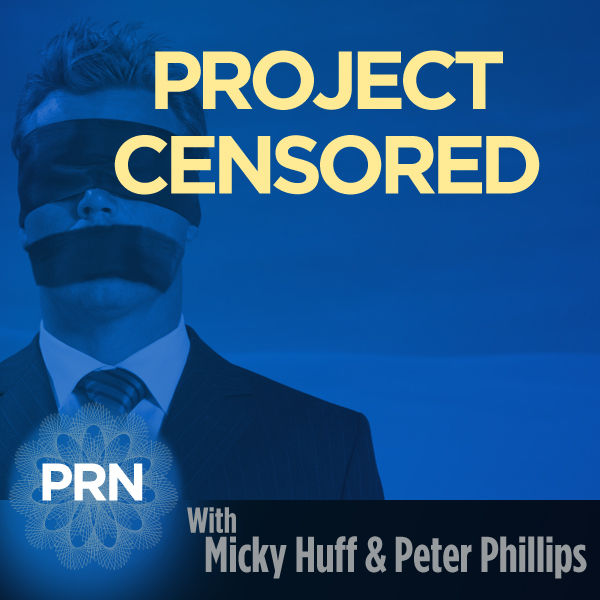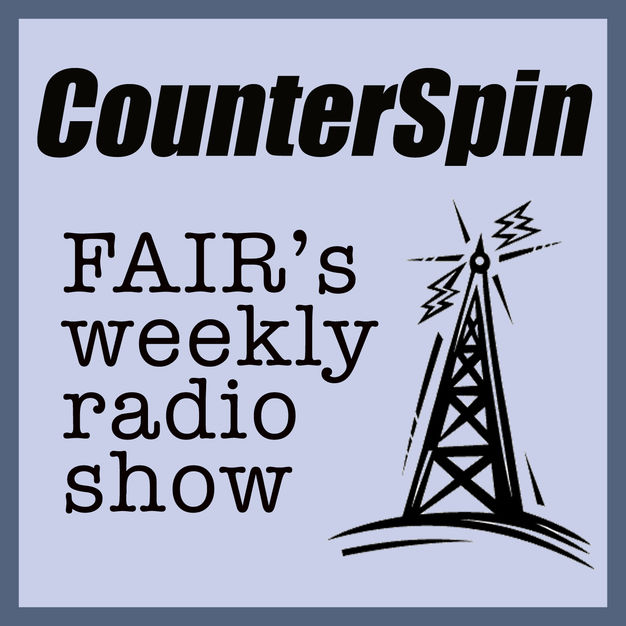
KPFA - CounterSpin
CounterSpin provides a critical examination of the each week’s major news stories, and exposes what the mainstream media may have missed in their own coverage. Combines lively discussion and thoughtful critique. Produced by the national media watch group FAIR (Fairness and Accuracy In Reporting).
- 29 minutes 58 secondsDerek Seidman on Insurance and Climate (2024) / Ariel Adelman on Disability Civil Rights (2024)
This week on CounterSpin:
While the New York Times rolls out claptrap about how both “the left and the right” have ideas about causes behind the devastating Los Angeles wildfires — the right blame DEI hires, while the left blame climate change — many people have moved beyond that sort of stultifying nonsense to work that directly confronts the fossil fuel companies, and their political enablers, for the obvious role that fossil fuels play in climate disruption, and that climate disruption plays in extreme weather events. Many are also now calling out insurance companies that take folks’ money but then hinder their ability to come out from under when these predictable and predicted crises occur.
Would you be surprised to hear that these powerful industries — fossil fuels and insurers — are intertwined? We talked about it last year with writer and historian Derek Seidman.
Did you see the coverage of how people with disabilities are dealing with the California fires’ impact? Probably not, given that the place of people with disabilities in elite media coverage ranges roughly from afterthought to absent. We talked about that last year with disability rights advocate and policy analyst Ariel Adelman, in the wake of a Supreme Court case that considered dismantling civil rights protections for people with disabilities by criminalizing the ways that we learn about whether those protections are actually real. We’ll hear that too.
The post Derek Seidman on Insurance and Climate (2024) / Ariel Adelman on Disability Civil Rights (2024) appeared first on KPFA.
19 January 2025, 6:30 pm - 29 minutes 58 secondsDean Baker on China Trade Policy
This week on CounterSpin:
New York Times columnist Thomas Friedman’s December 17 piece, headlined “How Elon Musk and Taylor Swift Can Resolve U.S.-China Relations,” contained some choice Friedmanisms, like: “More Americans might get a better feel for what is going on there if they simply went and ordered room service at their hotel.”
We’ll talk about China trade policy with Dean Baker, co-founder and senior economist at the Center for Economic and Policy Research.
Plus Janine Jackson takes a quick look back at press coverage of Luigi Mangione.
The post Dean Baker on China Trade Policy appeared first on KPFA.
12 January 2025, 6:30 pm - 29 minutes 58 secondsSonali Kolhatkar and Laura Flanders on Independent Media and the Year Ahead
This week on CounterSpin:
Among many other things, 2024 was a series of reminders that corporate news media, tasked primarily with enriching the rich and shoring up entrenched institutions, will not, today or ever, do the liberatory, illuminating work of independent journalism — that boldly speaks truth to power, that stands up for the societally voiceless, that provides space for the debates and discussions we need to move society forward — for those of us who believe that U.S. society needs to change.
New calendar years are symbolic, but they can also offer a fresh start. Why not see 2025 as a much needed opportunity to acknowledge, support, create, and grow independent journalism?
We talk about that this week with two people who are and have been doing not just critical, dissident, uplifting journalism, but the thinking and advocating around why we need it: Sonali Kolhatkar, from Rising Up! With Sonali, and Laura Flanders from Laura Flanders and Friends.
The post Sonali Kolhatkar and Laura Flanders on Independent Media and the Year Ahead appeared first on KPFA.
5 January 2025, 6:30 pm - 29 minutes 58 secondsThe Best of CounterSpin 2024
This is the time of year when we listen back to some of the conversations from the past year that have helped us clarify the events that bombard us — in part by showing how elite media are clouding them.
It’s not to say Big Media always get the facts wrong; but that what facts they point us toward, day after day, whose interpretation of those facts they suggest we credit, what responses we’re told are worth pursuing — all of that serves media’s corporate owners’ and sponsors’ bottom line, at the expense of all of our lives and our futures. An important part of the work we do — as producers and as listeners — is to help create and support different ways to inform ourselves and stay in conversation.
Guests featured on this year’s Best of CounterSpin include Chip Gibbons, Svante Myrick, Monifa Bandele, Aron Thorn, Evlondo Cooper, Joe Torres, Colette Watson, Greg Shupak and FAIR’s Julie Hollar and Jim Naureckas.
As always, we are deeply thankful to all of the activists, researchers, reporters, and advocates who appear on the show.
The post The Best of CounterSpin 2024 appeared first on KPFA.
29 December 2024, 6:30 pm - 29 minutes 59 secondsYanni Chen on TikTok Ban, Richard Mendel on Youth and Crime
This week on CounterSpin:
Writing for a DC court of appeals, Douglas Ginsburg said yes, banning the wildly popular platform TikTok does raise concerns about First Amendment freedoms; but it’s still good, because in pushing for the ban, the U.S. government “acted solely to protect that freedom from a foreign adversary nation.” If that’s clear as mud to you, join the club. We’ll get an update on the proposed ban on TikTok — in the service of free speech — from Yanni Chen, policy counsel at the group Free Press.
We’re all familiar with the “if it bleeds, it leads” credo of, especially but not only, local TV news. But just because we’re aware of it, doesn’t mean the phenomenon isn’t still impacting our lives in negative ways. Richard Mendel is senior research fellow for youth justice at the Sentencing Project. He joins us to talk about new research showing how news media coverage actively harms young people of color, as well as our understanding and policy-making around youth and crime.
The post Yanni Chen on TikTok Ban, Richard Mendel on Youth and Crime appeared first on KPFA.
22 December 2024, 6:30 pm - 29 minutes 58 secondsIman Abid on Israeli Genocide
This week on CounterSpin:
The New York Times says that Amnesty International recently became “the first major international human rights organization to accuse Israel of carrying out genocide in Gaza.” That makes sense if you ignore the other human rights groups and international bodies that have said Israel’s actions in the wake of Hamas attacks on October 7, 2023 meet that definition.
The Times account notes that genocide is hard to prove because it involves showing the specific intent to destroy a group, “in whole or in part” — something that, they say, Israeli leaders have persistently denied is their intent in Gaza. Declarations like that by Israeli President Isaac Herzog that “it is an entire nation out there that is responsible” appear nowhere in the piece.
The Times tells readers that Amnesty’s “contention” and “similar allegations” have been “at the heart of difficult debates about the war around the world.” So far, 14 countries have joined or signaled they will join South Africa’s genocide case against Israel in the World Court.
Gallup polling from March found that the majority of the U.S. public — 55%, up from 45% last November — say they disapprove of Israel’s siege of Gaza. And that support for Israel is dropping among all political affiliations.
A May survey from a private Israeli think tank says nearly a third of Jewish people in the U.S. agree with the charge of “genocide,” and 34% view college campus protests as anti-war and pro-peace, compared with 28% who see them as primarily “anti-Israel.” More recently, the Israel Democracy Institute reports its survey from late November, finding that the majority of Jews in Israel — 52% — oppose settlement in Gaza, while 42% express support.
There is absolutely debate around the world about Israel’s actions; outlets like the Times make that debate more “difficult” by misrepresenting it.
While not the first to ask us to see the assault on Palestinians as genocide, Amnesty’s report offers an opening, for those journalists who are interested, to ask why some are so invested in saying it isn’t. Iman Abid is the director of advocacy and organizing at the U.S. Campaign for Palestinian Rights (USCPR). We talk with her today.
Plus Janine Jackson takes a quick look at recent press coverage of the minimum wage.
The post Iman Abid on Israeli Genocide appeared first on KPFA.
15 December 2024, 6:30 pm - 29 minutes 58 secondsArlene Martinez on Amazon Misconduct / Neil deMause (2019) on Amazon HQ Fight
This week on CounterSpin:
Few corporations have changed the U.S. business and consumer model more than Amazon. So when that corporate behemoth buys one of the country’s national newspapers — it’s a conflict writ large as can or should be. But things as they are, reporting on Amazon has in general looked more like representing that conflict than confronting it.
Good Jobs First monitors megacompanies like Amazon and their impact on our lives. Their database, Violation Tracker Global, notes more than $2.4 billion in misconduct penalties for Amazon since 2010. The most expensive of those fines have been connected to the company’s anti-competitive practices; the most frequent offenses are related to cheating workers out of wages and jeopardizing workers’ health and safety. Arlene Martinez is deputy executive director and communications director at Good Jobs First. We’ll talk to her about the effort to #MakeAmazonPay.
A few years back, Amazon, like it does, dangled the prospect of locating a headquarters in New York City. And the city, like it does, eagerly offered some $3 billion in tax breaks and subsidies to entice the wildly profitable company to bring its anti-union, environmentally exploitative self to town. The deal fell through for several reasons, one of which was informed community pushback. We talk about it with journalist Neil deMause, co-author of the book Field of Schemes.
The post Arlene Martinez on Amazon Misconduct / Neil deMause (2019) on Amazon HQ Fight appeared first on KPFA.
8 December 2024, 6:30 pm - 29 minutes 58 secondsKatherine Gallagher on Abu Ghraib Verdict
This week on CounterSpin:
It wasn’t the horrific abuse of Iraqi detainees at Abu Ghraib prison, but rather, the pictures of it that forced public and official acknowledgment. The Defense Department vehemently resisted the pictures’ release, with good reason. Yet when, after the initial round, Australian TV put out new images, Washington Post executive editor Len Downie said they were “so shocking and in such bad taste, especially the extensive nudity, that they are not publishable in our newspaper.” The notion that acts of torture by the U.S. military and its privately contracted cat’s paws are, above all, distasteful may help explain corporate media’s inattentiveness to the efforts of victims of Abu Ghraib to find some measure of justice.
But a federal jury has just found defense contractor CACI responsible for its part in that abuse, in a ruling being called “exceptional in every sense of the term.” The Center for Constitutional Rights has been behind the case, Al Shimari v. CACI, through its long roller coaster ride through the courts — which isn’t over yet. We hear about it from CCR senior staff attorney Katherine Gallagher.
Plus Janine Jackson takes a quick look at recent press coverage of the ICC’s Israel warrants.
The post Katherine Gallagher on Abu Ghraib Verdict appeared first on KPFA.
1 December 2024, 6:30 pm - 29 minutes 58 secondsAmos Barshad on Legalized Sports Betting
This week on CounterSpin:
Passed by a whisker in Missouri on November 5, legal sports gambling is the apple of the eye of many corporate and private state actors — but how does it affect states, communities, people? Journalist Amos Barshad wrote in-depth on the question ahead of the election. He is senior enterprise reporter for the Lever and author of the book No One Man Should Have All That Power: How Rasputins Manipulate the World, from Abrams Press.
Plus Janine Jackson takes a quick look at recent press coverage of Trump’s nominees and a Nazi march.
The post Amos Barshad on Legalized Sports Betting appeared first on KPFA.
24 November 2024, 6:30 pm - 29 minutes 58 secondsAdam Johnson on Charlottesville March (2017) / Jacinta Gonzalez on Criminalizing Immigration (2018)
This week on CounterSpin:
We revisit the conversation we had in August 2017 in the wake of the Unite the Right march in Charlottesville, Virginia. Writer and podcaster Adam Johnson had thoughts about the way so-called “mainstream” news media responded to a straight-up celebration of white supremacy.
If we’re to believe the chest-thumping, high on Trump’s agenda will be the enforced criminalization of immigration. We talked about that in July 2018 with Jacinta Gonzalez, senior campaign organizer at Mijente.
Plus Janine Jackson takes a quick look at some recent press about Chris Matthews’s “morning after,” the New York Times‘ promoting white resentment, and Israel’s assassination of journalists.
The post Adam Johnson on Charlottesville March (2017) / Jacinta Gonzalez on Criminalizing Immigration (2018) appeared first on KPFA.
17 November 2024, 6:30 pm - 29 minutes 58 secondsJulie Hollar and Jim Naureckas on Placing Blame for Trump
This week on CounterSpin:
We talk about what just happened, and corporate media’s role in it, with Julie Hollar, senior analyst at the media watch group FAIR, and FAIR’s editor Jim Naureckas.
We also hear some of an important conversation we had with political scientist Dorothee Benz the day after the January 6 attack on the Capitol.
Plus Janine Jackson takes a quick look at non-presidential election results.
The post Julie Hollar and Jim Naureckas on Placing Blame for Trump appeared first on KPFA.
10 November 2024, 6:30 pm - More Episodes? Get the App
Your feedback is valuable to us. Should you encounter any bugs, glitches, lack of functionality or other problems, please email us on [email protected] or join Moon.FM Telegram Group where you can talk directly to the dev team who are happy to answer any queries.
 KPFA - The Visionary Activist Show
KPFA - The Visionary Activist Show
 Rising Up with Sonali
Rising Up with Sonali
 KPFK - Beneath The Surface
KPFK - Beneath The Surface
 Project Censored
Project Censored
 CounterSpin
CounterSpin
 KPFA - Womens Magazine
KPFA - Womens Magazine